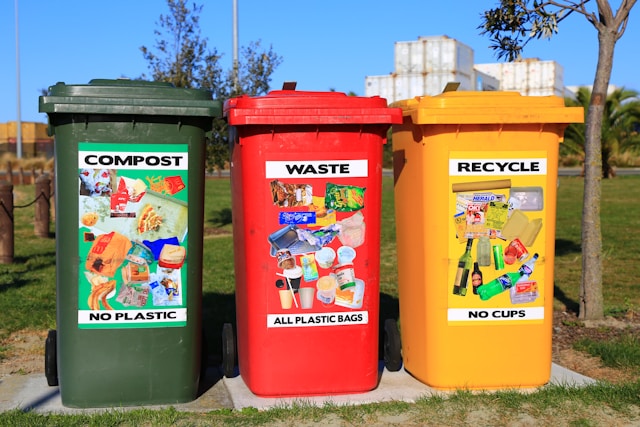Photo by Nareeta Martin on Unsplash
As everyone generally works to lower emissions and improve the globe, innovative features like alternative energy sources and clean air zones are taking the market by storm. Businesses can focus on recycling to help the environment, even while large ideas like solar panels and electric cars sound like great ways to help the earth. While many people recycle at home, workplaces may not always follow these best practices. Increasing recycling at the company is very simple if you’re an employee or business owner who cares about the environment. The following recommendations could be useful to you.
Recycle Old Textiles and Uniforms
As an alternative to discarding your old outfits. How about recycling them? Make recycling a priority for you and your company’s trash disposal requirements. Provide a special clothing and textiles bin so that employees may easily dispose of their used clothing and materials and know that they will be recycled completely. You may even arrange frequent pick-ups and cooperate with a recycling center. Seek organizations that share your beliefs as a business and your community objectives.
Make Recycling Easy at a Glance
Any small business values time above all else; you want to be spending it on activities that directly pay for themselves. Most smaller companies would agree that waste management is not considered a major source of income. However, misplacing the wrong items in the incorrect container might cause financial and administrative problems.
Clear signs and bin placement help you make it simple for clients and coworkers to participate in recycling. Try arranging your recycling and general garbage bins with unhindered access. Anything you can do to make the procedure automatic helps since people will be less likely to walk to another place to recycle. Put prominent signs with symbols all around the bins so anyone may quickly identify them.
Embrace Upcycling
One creative approach to give worn-out and trash items fresh life is upcycling. Get imaginative and use them instead of throwing them away. Urge your company to adopt upcycling, using resources and turning them into valuable assets. Upcycling lessens waste and shows your dedication to sustainability, whether by reusing workplace furniture or creatively using packaging materials.
Businesses can upcycle old desks, seats, or cabinets. They can renovate or repaint them to provide a new appearance instead of throwing them away. Extending the furniture’s lifetime lowers waste and enables cost savings. One can also use packaging materials for organizers or storage containers.
Separate Your Waste
One of the most typical ways a company fails in recycling is not providing the choice to divide your waste out, only providing a single bin that will not be recycled. Establishing distinct containers for every recycling can help your company recycle faster and easier. While general waste is still good, you should have food waste, cardboard, plastic, and glass containers. This allows every staff member to easily toss their recyclables into the appropriate bin. This will ensure they reach the correct place for reuse or recycling.
If you have a big office with several bins, include recycling containers anywhere standard bins are used. This inspires even more recycling since someone might be lazy and toss their garbage into a regular container that would be more handy for them rather than walking to the recycling location.
Switch to Paperless
Reducing the general requirement for recycling might also be a fantastic approach to help recycling at your company. Many companies are achieving this by deciding to be paperless. This entails uploading all their records and tools online, lowering the demand for paper the company purchases and uses.
You can transfer existing documents online and later recycle them. This benefits the environment and enables the recycling of these unnecessary documents into new materials. Instead of depending on paper solutions to complete your work, you can aim to promote computer, laptop, and tablet use at your business. Unless necessary, get rid of your printer so nobody is tempted to waste paper on something readily available online. This will also cut printing costs and mean fewer copies of possibly private records.
Endnote
You can target at least one of these five adjustments to help your small business be more sustainable, even if you cannot implement all five. This will put you on the correct road, free from your carbon footprints.




